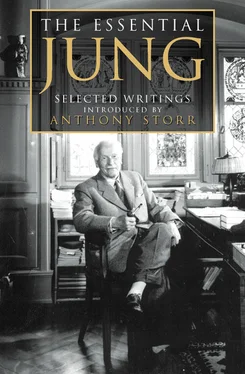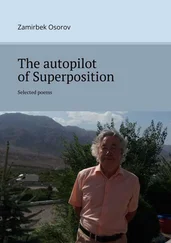I spoke with my wife about this, and told her of my fears. She attempted to reassure me, for she thought that Freud would magnanimously raise no objections, although he might not accept my views. I myself was convinced that he could not do so. For two months I was unable to touch my pen, so tormented was I by the conflict. Should I keep my thoughts to myself, or should I risk the loss of so important a friendship? At last I resolved to go ahead with the writing – and it did indeed cost me Freud’s friendship.
In the following passage, Jung elaborates the idea that regression occurs when inner conflict prevents the individual’s adaptation to the external world. He goes on to show that the unconscious contents reactivated by regression contain the germs of a new and better adaptation. (The balance of opposites and the notion of compensation which Jung touches on in the passage below will be reviewed in more detail later.)
From “On Psychic Energy” CW 8, pars. 60–9
FUNDAMENTAL CONCEPTS OF THE LIBIDO THEORY
Progression and Regression
One of the most important energic phenomena of psychic life is the progression and regression of libido. Progression could be defined as the daily advance of the process of psychological adaptation. We know that adaptation is not something that is achieved once and for all, though there is a tendency to believe the contrary. This is due to mistaking a person’s psychic attitude for actual adaptation. We can satisfy the demands of adaptation only by means of a suitably directed attitude. Consequently, the achievement of adaptation is completed in two stages: (1) attainment of attitude, (2) completion of adaptation by means of the attitude. A man’s attitude to reality is something extraordinarily persistent, but the more persistent his mental habitus is, the less permanent will be his effective achievement of adaptation. This is the necessary consequence of the continual changes in the environment and the new adaptations demanded by them.
The progression of libido might therefore be said to consist in a continual satisfaction of the demands of environmental conditions. This is possible only by means of an attitude, which as such is necessarily directed and therefore characterized by a certain one-sidedness. Thus it may easily happen that an attitude can no longer satisfy the demands of adaptation because changes have occurred in the environmental conditions which require a different attitude. For example, a feeling-attitude that seeks to fulfil the demands of reality by means of empathy may easily encounter a situation that can only be solved through thinking. In this case the feeling-attitude breaks down and the progression of libido also ceases. The vital feeling that was present before disappears, and in its place the psychic value of certain conscious contents increases in an unpleasant way; subjective contents and reactions press to the fore and the situation becomes full of affect and ripe for explosions. These symptoms indicate a damming up of libido, and the stoppage is always marked by the breaking up of the pairs of opposites. During the progression of libido the pairs of opposites are united in the coordinated flow of psychic processes. Their working together makes possible the balanced regularity of these processes, which without this inner polarity would become one-sided and unreasonable. We are therefore justified in regarding all extravagant and exaggerated behaviour as a loss of balance, because the coordinating effect of the opposite impulse is obviously lacking. Hence it is essential for progression, which is the successful achievement of adaptation, that impulse and counter-impulse, positive and negative, should reach a state of regular interaction and mutual influence. This balancing and combining of pairs of opposites can be seen, for instance, in the process of reflection that precedes a difficult decision. But in the stoppage of libido that occurs when progression has become impossible, positive and negative can no longer unite in coordinated action, because both have attained an equal value which keeps the scales balanced. The longer the stoppage lasts, the more the value of the opposed positions increases; they become enriched with more and more associations and attach to themselves an ever-widening range of psychic material. The tension leads to conflict, the conflict leads to attempts at mutual repression, and if one of the opposing forces is successfully repressed a dissociation ensues, a splitting of the personality, or disunion with oneself. The stage is then set for a neurosis. The acts that follow from such a condition are uncoordinated, sometimes pathological, having the appearance of symptomatic actions. Although in part normal, they are based partly on the repressed opposite which, instead of working as an equilibrating force, has an obstructive effect, thus hindering the possibility of further progress.
The struggle between the opposites would persist in this fruitless way if the process of regression, the backward movement of libido, did not set in with the outbreak of the conflict. Through their collision the opposites are gradually deprived of value and depotentiated. This loss of value steadily increases and is the only thing perceived by consciousness. It is synonymous with regression, for in proportion to the decrease in value of the conscious opposites there is an increase in the value of all those psychic processes which are not concerned with outward adaptation and therefore are seldom or never employed consciously. These psychic factors are for the most part unconscious. As the value of the subliminal elements and of the unconscious increases, it is to be expected that they will gain influence over the conscious mind. On account of the inhibiting influence which the conscious exercises over the unconscious, the unconscious values assert themselves at first only indirectly. The inhibition to which they are subjected is a result of the exclusive directedness of conscious contents. (This inhibition is identical with what Freud calls the “censor.”) The indirect manifestation of the unconscious takes the form of disturbances of conscious behaviour. In the association experiment they appear as complex-indicators, in daily life as the “symptomatic actions” first described by Freud, and in neurotic conditions they appear as symptoms.
Since regression raises the value of contents that were previously excluded from the conscious process of adaptation, and hence are either totally unconscious or only “dimly conscious,” the psychic elements now being forced over the threshold are momentarily useless from the standpoint of adaptation, and for this reason are invariably kept at a distance by the directed psychic function. The nature of these contents is for all the world to read in Freudian literature. They are not only of an infantile-sexual character, but are altogether incompatible contents and tendencies, partly immoral, partly unaesthetic, partly again of an irrational, imaginary nature. The obviously inferior character of these contents as regards adaptation has given rise to that depreciatory view of the psychic background which is habitual in psychoanalytic writings. * What the regression brings to the surface certainly seems at first sight to be slime from the depths; but if one does not stop short at a superficial evaluation and refrains from passing judgment on the basis of a preconceived dogma, it will be found that this “slime” contains not merely incompatible and rejected remnants of everyday life, or inconvenient and objectionable animal tendencies,but also germs of new life and vital possibilities for the future. * This is one of the great merits of psychoanalysis, that it is not afraid to dredge up the incompatible elements, which would be a thoroughly useless and indeed reprehensible undertaking were it not for the possibilities of new life that lie in the repressed contents. That this is and must be so is not only proved by a wealth of practical experience but can also be deduced from the following considerations.
Читать дальше












